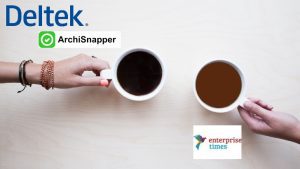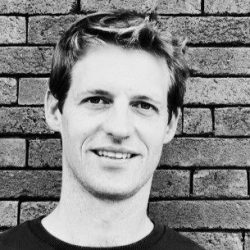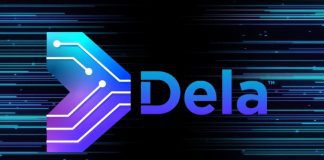
Where is the conversion rate in North America?

“The product was first released in Belgium. We were the first on the market in Europe. The conversion rate has always been very high here in Europe. Pre-acquisition, we didn’t have any sales reps or any local people in North America, so the conversion rate was much lower as it was completely self-service, where there was no one calling them, and no one was assisting with the free trial.
“Post-acquisition, people are assisting North American users to get successful with the product during the trial. That has increased the conversion rate. It is not yet like in Belgium because we are a trusted brand, and everyone knows us. On every construction site in the country, one of the parties uses the application. In North America, we entered later, and there are other solutions. The conversion rate has definitely increased thanks to having a local presence and having people calling into the trial values.”
On Product
How has the product improved since the acquisition?
“We’ve been able to keep working on the product as before but with a bigger team and a good focus. When you join a bigger firm, there’s always a risk that there are lots of meetings or tasks or things that don’t add value directly in the short term because there is more overhead, rules and policies, etc. After the acquisition, there were some good hires in the development team. We’ve been able to build a good team. We also had the chance to focus on developments and less on corporate stuff.
“From day one, we always aligned on what features we would build based on what we heard from our clients. We always build whatever comes up most and what we think adds the most value to the whole user base, not what one specific person is asking. Even when it’s a big potential client (asking) because we want the product to stay very simple. There was no interference from other people at Deltek. We are still in charge of the roadmap. The client is still in charge of the roadmap.”
On ArchiSnapper
ArchiSnapper exists as a brand and product. How did the organisation change? Is it a separate business unit?
“Product-wise, it’s quite independent. We have Pieter (Eerlings) managing the team, both mobile developers and web developers. The sales reps with us here in Benelux are still working for me. We have a good support team that Pieter and I also have calls with every day. The only different thing is the marketing type of work. For example, marketing in North America was something we didn’t do pre-acquisition. As a result, the (Deltek) marketing team can just add ArchiSnapper to the product portfolio and do some things.
“70-80% of the core processes of our business development, support and sales work as before. Only one thing changed. Pre-acquisition, things like reporting and measuring KPIs, I know everyone has to do that, it’s in all the books, but we just didn’t do it. We worked day after day, working on features and for clients. After the acquisition, we were forced to work a bit more on those things, building dashboards and ensuring that the Deltek management can see how the business is evolving without needing calls every day.”
I’m assuming that pre-acquisition because you were pretty successful. You had the money rolling in, so you just keep on going? Few software firms are in that luxurious position in their early days anyway.
“We’ve been focusing on profitability from day one. So we never considered outside funding. We never had loans. We wanted to be independent. No bosses that give us money and that we have to listen to. You might miss an opportunity for hyper-growth. But it was really cool for us to be our boss and have our organic growth, just be free. There was no pressure from anyone.
“We were profitable from day one and loved that we didn’t grow like the high success stories. But we were profitable, were proud of that, and we didn’t have debt. The only number we tracked pre-acquisition was our MRR, our monthly recurring revenue. That’s the only thing that mattered. We didn’t care about training or custom work. We just wanted our recurring revenue to grow at a steady rate. As long as that was the case, we were happy and tracked that continuously.”
Why sell?
“That’s a lifestyle choice. Pieter and I don’t have wealthy parents. If you have an investment in the stock market, you can buy an ETF and spread over 1000s of businesses. We had one thing, and it was ArchiSnapper. You’re not the best manager when you are so personally involved financially in something. Maybe you’re not the best manager because you can’t distance yourself and do what’s best for the firm because you are too risk-averse.
“We wanted to take some money off the table. We are still only 40 years old and want another role and mindset in life. Bootstrapping a firm is hard. It dominates the mind that dominates the thoughts and life. We both have three children and now we are more managers. We see the numbers and take decisions but are less personally and financially involved in it. It consumes less of our mental energy.”
How it all started
What was your original vision behind ArchiSnapper?
“Before launching ArchiSnapper, Pieter and I had a software business where we developed software on demand—a website, an eCommerce system, a stock system. As you can imagine, it’s like starting over and over again.
“We were a bit stressed at some point and said, Okay, we have to decide if we don’t want to do this for another 10 years. We read everything we could. We listened to every podcast about recurring revenue, of having a product business versus a service business. One of the things that we learned first is instead of coming up with this great idea and imagining how it will conquer the world, make sure you have an audience first. Make sure you have someone sharing their pain point with you, and validate it in the market.
“For a couple of days, I defined some verticals from a phone book. I cold-called doctors, architects and all kinds of people and asked them one simple question, “Do you have an administrative pain point? Do you have a problem, something that bothers you? In your job, do you have Excel flying around?” You get a lot of no’s and leave me alone. But then there was this one guy, an architect, that says, ‘Okay, I’m struggling so hard with field reports. If someone could solve this problem, I would be incredibly happy.’
“I immediately drove to that person. It was two years after Apple launched the first iPad. So the timing was really beautiful. Back then, tablets were more for gaming, not for business use. I wrote out the specs. We started emailing other architects and having discussions with other architects to validate the idea.
“When lots of people said, ‘Yes, when you have this, we will buy it’, then we start building it. That was the kickoff of our product-based business. We really wanted a product with recurring revenue that was very scalable. You build it once, and you can add to it every day, and you build value in the business. You do more marketing for the same product and business versus having to start over and over again with the services business.”
That was the vision we had. We wanted to have a scalable product-based business that’s highly automated.
“One with lots of Simplicity on it, simple pricing, and simple product because we believe that simplicity is an amazing feature for both a business and a product.”
On Simplicity
De Paepe explained the simplicity value further.
“For a business having people that can manage themselves, you don’t have a lot of rules, have a lot of autonomy. Also, as a product, we really believe that a simple product is incredibly valuable. We believe in the product and the principle of underdoing the competition. Because when you can compare feature lists, simplicity is a very important feature.
“It’s a feature of a product. People must be able to use it during a free trial and discover how it works; if they don’t, they are gone, and we will never see them again. If you sell ArchiSnapper to a big firm, all people must use it. So adoption has to be high, and Simplicity is super important, more important than many other features if you want it adopted in a business. We wanted to have an automated business with recurring revenue and with simplicity all over the place. That was the vision of what we want to achieve.”
On The Target Market
Your initial target market was Architects, but that has evolved. What is the target market now?
“It’s architects, engineers, and contractors, especially here in Belgium, because we are close to the market here and have quite a good brand name. We have a decent chunk of contractors using it for punch lists, safety inspections and daily reports.”
Has the vision evolved since the acquisition? From what you’re saying, it hasn’t, which is a credit to Deltek.
“Exactly, they let us carry on, and they also said to everyone, this is purpose-built for architects and engineers. We will sell this in our installed base to architects and engineers. We don’t want to interfere with the roadmap because some big contractor says, “If you do this and that, then we will buy it.” So that has never happened. We’re still doing what we did before.
“When we talked during the negotiations, Deltek saw that this is a product for architects and engineers, and after the acquisition, we have to position it like that. That was what made me feel good as well. They see it as a product for architects and engineers, not the next Procore or thing to rule the construction market.”
ArchiSnapper had already integrated with BQE Core and Synergy team leader when the acquisition was completed. What about integrations with Deltek solutions?
“We have integrated with Ajera, and Vantagepoint, one to three months after the acquisition. At record speed because we had a good API and a lot of experience with building integrations. ArchiSnapper is always seen as an add-on in firms.
“We still have some integrations with other parties because these integrations add value to our clients. We didn’t want to take away value from our existing clients just because we sold the business to someone else. We do still have integrations with the local project management system. Our clients that have been with us for 10 years still benefit from those, and we want to keep it like that.”
Are you looking to add any further integrations with other products?
“We’re not actively working on that. It’s also not a ‘ No’. It’s not that it’s forbidden. If it’s common sense to do it, then I think we should be open to it.”
Roadmap
What’s on the roadmap for 2023?
“It’s still adding small features that our clients are asking day in, day out. Of course, we also look at the big things: What’s going on in the market? What are the evolutions we see? We have a publicly available roadmap. People who use the product have it on their dashboard as well. We update it all the time.
“Right now, our clients are happy. We see new clients coming in all the time. It means that our product still solves their problem, and we’re still working on things they ask us weekly. We have one product for the whole client base, and we have releases continuously.”
Doesn’t that pose a risk for you being disrupted by someone new in the industry? Someone who has built a product powered by AI or other modern technology?
“There is always a risk. The answer to that question can never be no. But I do believe that right now, and I think Excel and Word will be our biggest competitors for years to come. Architects and engineers still struggle with Word and Excel. They are just looking for a simple solution to save time, be more professional, and collaborate better with their stakeholders. I also believe strongly in the principle of underdoing your competition. I like building a small beautiful product.”
What about AI? Will you introduce AI into the product?
“We are keeping track of those evolutions, but there is no specific plan to add it right now.”
The book question
What was the latest book you read, and what was your take out for business from it?
“My favourite business book is Rework (by David Heinemeier Hansson and Jason Fried – Amazon Aus, UK, US) the Basecamp guys, 37 signals. It has everything I love about business. I’ve been so inspired by them. I’ve read it a couple of times. It’s the simplicity of being pragmatic, isolating yourself from hype, don’t go to startup events, just focus on your clients, do something valuable, don’t have too many calls or chats going on. Do meaningful work in a tranquil way. Focus on your clients. Focus on the money coming in. I really like those principles, and I would recommend them to anyone, even those working in a corporate environment. I think it could be an eye-opener to many people. I love it.”


























